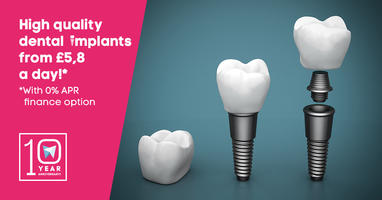- Home
- Dental Implants
- Denture Stabilization
- FAQ - Denture Stabilization
FAQ - Denture Stabilization
 How many implants will I need?
How many implants will I need?
There is more than one answer to this question. It depends on whether you want a full or partial denture, what orthodontic condition your jaw is in, how good your bone density is, what sort of medical history you have, if you have experienced tooth loss, etc. The option with the fewest implants involves one implant with a ball attachment attached to a click bar that is a part of the denture. There are versions that involve 4 implants, 6 or 8 as well. All of these numbers should be understood as per arch. The best way to know for sure is to come to a consultation session, and see what your doctor has to say.
What kind of crowns do you use on the denture?
We use the same types of crowns for all of our appliances and prostheses. We use surgical metal fused to porcelain shells, or zirconium fused to porcelain outer shells. If you want to learn more about our available variety of crowns, please click here.
How many teeth do I have to have lost in order to qualify for an overdenture?
As with all dentures, it is necessary to have all of your teeth removed, or they should already be missing. The idea behind these appliances is that they are a new sort of denture, so we usually recommend it for people who need dentures. If you have a few teeth left but are interested in this option, the extraction of teeth is perfectly possible, and may even be the best long term solution.
Denture Stabilization Using Small Diameter Implants
Denture Stabilization
Stabilizing your dentures using dental implants has many benefits and is becoming more and more popular amongst those of us who wear dentures. The upsides are so obvious, no more gooey and uncomfortable adhesives on your gums and mouth, no more irritating, potentially debilitating mouth plate, and most importantly, no more embarrassing situations in which the denture moves away or falls out altogether. We can always be sure that our smile is exactly the way we left it, but there are drawbacks too.
Drawbacks of Regular Dental Implants
One of the most obvious drawbacks is the price. Dental implants are an expensive enterprise, but when you think about it, you only need to pay for them once, as they will stay with you until your last days. The main problem is that often times people who wear dentures wear them because all of their teeth are gone, which usually leaves them with poor alveolar tissue, and a weakened jaw bone. This condition makes it hard for them to be implanted, as the dental implant usually goes into the jawbone of the patient, but there needs to be sufficient bone density to house the implant, otherwise the patient cannot receive them. Tooth loss is a condition that makes such implantation unsuitable, with regular dental implants.
The only alternative up until recently was an expensive and incredibly invasive oral surgical procedure known as a bone graft. A bone graft is basically when they open a flap of skin and gum tissue, drill your bone and enhance it with a graft material, either from another person, your own bone material, or synthetic bone replacement material.

SDIs
But this is where small diameter implants (SDIs) come in. Much smaller than regular dental implants (about one third the size), they can fit in to jawbones of much smaller density than regular dental implants. That means a less invasive surgery when entering the dental implant, and no bone grafts are required either. Truly this is a cheaper, more affordable solution for denture stabilization, as the SDIs or mini-implants are much cheaper than regular implants, and you need the same amount to stabilize a denture, namely 4 or 8, in most cases. The other reason is because without a bone graft, the cost of the procedure is much cheaper, sometimes even cut in half. So this option is definitely worth checking out, and you can read more about them here.
What Sort Of Dentures Are Used In Stabilizations?
The dentures used are your standard dentures, except for a slight modification. They are fitted with either a click bar or a base that has abutments manufactured into them that are able to house dental implants.
A click bar is fitted with an o-ring that can be easily attached to any dentures, with slight modifications. If your denture has a base of resin or metal, or pretty much anything, a dental technician can remodel it so that it will be able to house dental implants. Dentures made of any material, resin, metal, plastic or even wood (just kidding) can be remanufactured to handle dental implants.
Change your life once and for all with our top quality dental implants ‐ from the price of £5,8 per day only and no interest to pay.*
The offer is valid until withdrawal.
Registration
Register for dental checkup!
-
Why Are My Teeth Moving?
- 2019. May 15
-
Nanotechnology for Better Dental Implants
- 2019. May 05
-
Foods to Prevent Dental Cavity
- 2019. April 25
-
Dental Implant FAQ 3.
- 2019. April 15
-
Dental Implant FAQ 2
- 2019. April 05

